Welcome to the CM3940 Class Blog! Question? Contact Prof. Ray: meray at plymouth dot edu.
Don't wanna be here? Send us removal request.
Text
Social Media and Shopping addictions
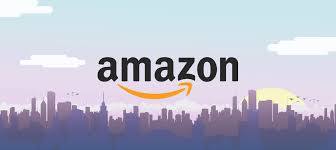
While yes Amazon isn’t technically a form of social media, it has very special distinct ties to our social media that we can see every day.
The internet has gotten to a place where your location is always known, and social media sites have access to algorithums that YOU make by interacting with them. It is crazy to me that sites like Amazon take what we buy or even look at and then display them on other social networking sites to influence decisions that we make.
For example, one of my close friends is very addicted to her social media, and even more addicted to what online deals she can find. The holidays has capitalized more on what her favorite purchases were, and were offering deals and more and more frequented advertisements on Facebook, and Instagram.
I’ll be the first to admit that having that kind of connection between Amazon and my social media did make me more likely to buy more items for my family this holiday season. However I found myself one night actively waiting to see what a new deal would be or something new for me to purchase that I had never seen before.
It was in this moment that I realized that this is something that social media has been doing for a while now, getting more exposure to you based off of our own desires on items.
I checked back in with my friend after coming to this revelation, and when I had gotten to her house she had at least twenty packages waiting for her. Social media has the power to influence, and if we aren’t careful we could just be blowing through money we don’t even have!
0 notes
Text
Surveillance effects our society
I thought this was a perfect topic to blog about because this topic is what i’m writing about in my final paper for this class. The topic of surveillance and how were surrounded by cameras every day. The fact that everyone of us carries a camera in their pocket every day, is something to think about. We all have a phone, and with that phone comes a camera. We have the ability to videotape or photograph anything we want to, at any time due to having this camera on our phone. That fact, has changed our society immensely. You go to a concert for example and you look around and see hundreds of people with their arms stretched out trying to get the best shot with their mobile phone, looking at the concert through a screen. Now a day no one can go to a concert and not take a picture or video of the concert, society tell us we must and then to post that given video or picture online to show our friends and family. Almost to brag about it and say “hey i want to this concert, it was awesome, are you jealous of me and my life? This article called, Five ways the digital camera has changed us, really goes over what I’m trying to say in this post. How the invention of the digital camera gave us the ability to take more photos, but when the iPhone came around it changed everything about our society. Apple really wanted to change the game and integrate all the interactivity into one phone.
http://www.bbc.com/news/magazine-16483509
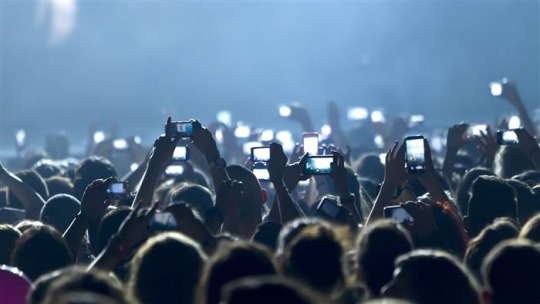
0 notes
Photo
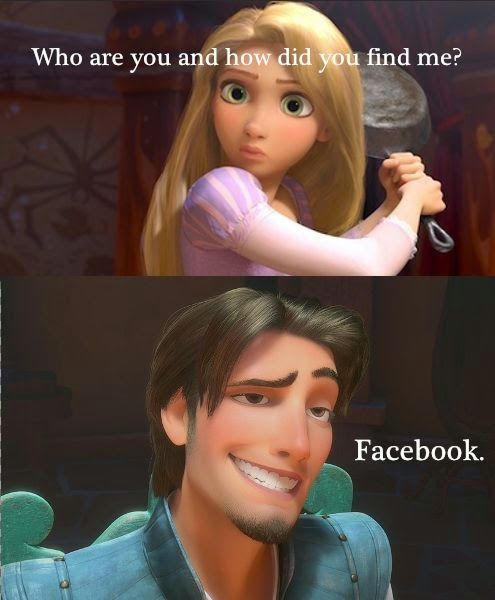
I thought this meme from the Disney movie Tangled, was a perfect example of Searchability. In this meme, Rapunzel is asking the Price "Who are you and how did you and find me?" and the prince answers back by saying "Facebook". It is funny because if you have a profile on facebook, you know how easy it can be to search and find someone new you are looking for. In the movie Tangled, Rapunzel is hidden away in a forest, far from the king and queen. Her guardian, Mother Gothel, is a old witch who stole Rapunzel as a kid because of Rapunzels powers that will make Mother Gothel live forever. The funny part about the meme is, that Rapunzel was hidden away in a very private location. But because she had a facebook account, that hidden tower in that private location wasn't hard for the price to find. Obviously this didn't really happen in the movie, but the thought of being tracked down using information that was found online is a scary thought. If you went on vacation and posted a picture of you on the beach in Florida. The second you post that picture, people are going to know that you are on vacation and that your house is empty. If the wrong person sees that, they could end up breaking into your house and stealing things. Thats why whenever I am on vacation, my parents tell me to turn off my location and don't post pictures of where we are. I never really took it seriously until this last year, when one of our neighbor’s houses got broken into while they were away on vacation. After that, I realized how dangerous your information online could be and became a lot more cautious of what information I put online.
https://www.pinterest.com/pin/557953841319330679
0 notes
Text
Should kids have smartphones?
Do you remember your first phone? Chances are it was a penny phone that didn't have much to it. If you were to ask someone a bit younger they might answer saying that the iPhone was their first phone. Many kids today get their first phone when they are in second or third grade. I have mixed feelings about kids having smart phones this early on in their life. I do think it is important to always be able to communicate/make a call, but what about all the other features of a phone? There are many things out there on the internet that kids shouldn't be seeing. For example, I see a lot of provocative posts on Instagram. The thing about Instagram is most of these posts are available to everyone. Only some meme accounts are private, but even if they are it's not like they check to see how old someone is before accepting their follow request. What is your opinion on kids having smartphones? Do you think there should be a certain age when kids should be given their first phone? And should these phones be smartphones?
http://www.debate.org/opinions/should-kids-have-iphones
The link above is a debate page dedicated to the argument on whether or not kids should have iPhones.
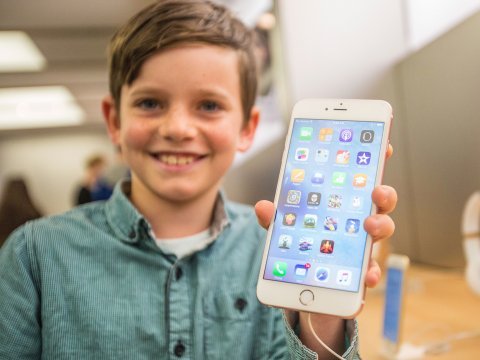
0 notes
Text
Music Sampling
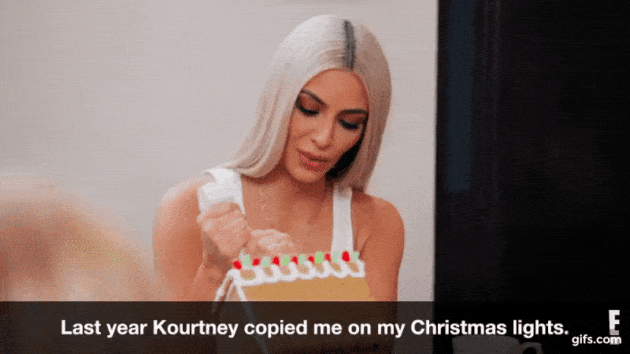
So, discussing copyright laws, artist's rights, and general digital content ownership for the past week put the thoughts of music sampling in my head already. My roommate, who is a Music Education major, is currently teaching similar content to a class she TA's for. So let's talk about sampling!
For fun, here's a quiz to see how much you know about pop culture history. Can you match the song to the song it sampled? https://www.sporcle.com/games/dgwalter/sampled-songs
As technology has progressed so has digital content protection, as we've learned. Early artists would simply sample another musicians music without their permission; taking it as their own. Once incorporating samples began to make significant money for artists, legal issues arose and copyright infringement was claimed. What are your thoughts on sampling? While classics are unmistakable (aka "Under pressure." We all know, Vanilla Ice. You weren't slick.) Many pop songs sound similar already, and often are using very similar notes. Are the reasonable claims to sampling copyright infringement? Are there unreasonable claims? If you were a famous artist would you want compensation, give free permission, or just call them out on Twitter and never pursue legal ramifications?
More fun, I am not a Katy Perry fan, and this is my favorite sampling jab- Katy Perry's Roar and Sara Barreilles' Brave.
https://music.avclub.com/katy-perry-s-roar-is-a-kind-of-a-rip-off-but-at-leas-1798265661
0 notes
Text
Reflecting on Terms and Conditions
I've been thinking an awful lot about the Terms and Conditions May Apply Documentary that we viewed in class, and why it is so important for not just those of us in our major, but for everyone to pay attention to.
I recently rewatched the episode of South Park which dealt with these exact same ideas of really paying attention to what you are signing up for. The episode highlights the idea that Kyle messes up and signs up for the new Itunes terms and conditions, without actually reading them, and then he becomes subject to what he agreed to within them. That entails being a part of the "human Centipad experiment.
Obviously this is a huge over exaggeration of what it means to agree to a specific terms and conditions from ITunes, but the message is very clear that we don't always read what we are agreeing to and it could lead to some hardships, if you don't become familiar.
Especially to those of us who are content creators and want our work to be appreciated and loved by people, and not as something they can just rip off the internet for free. We discussed in class the kinds of advantages and disadvantages that come about from making your work public on the internet, but my question is to all of you, is it worth it to post works that you are proud of on the internet even if it could be taken? Is it more important for a lot of people to see your work, or to keep it out of the hands of those who want to exploit it?
http://southpark.cc.com/clips/382783/i-agreed-by-accident
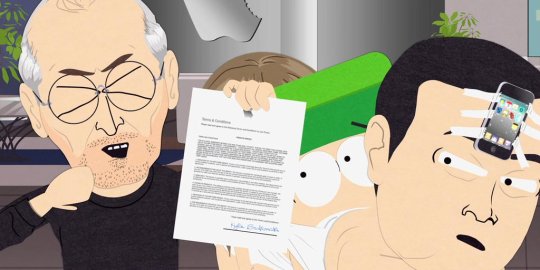
8 notes
·
View notes
Photo
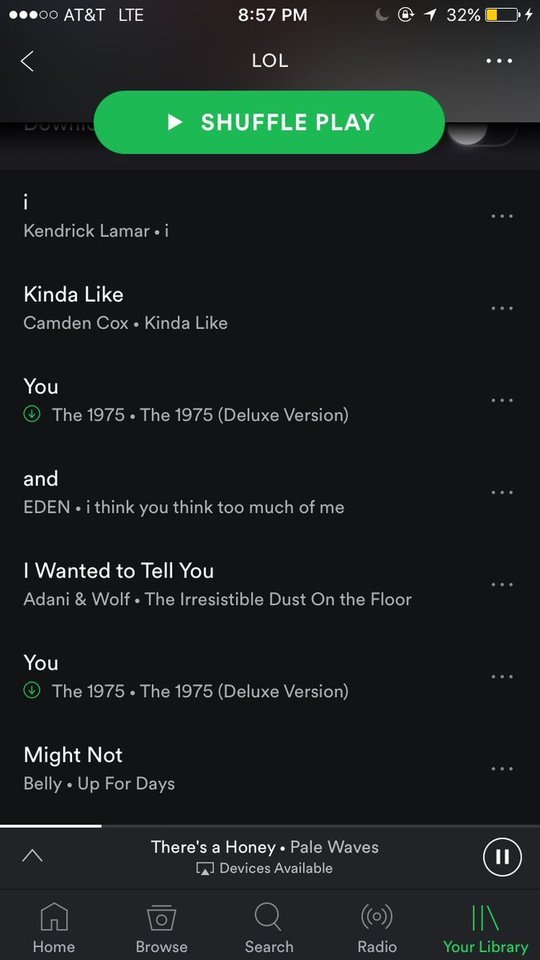
What does your playlist say about you?
With so much attention on Spotify after the "Spotify Wrapped" campaign (check yours out here https://open.spotify.com/view/2017-page), I thought it would be a good time to dive into the concept of what playlists on apps like Pandora, Spotify, and Apple Music say about their listeners. In an article posted by CNN (which can be read right here http://www.cnn.com/2016/03/31/health/what-music-reveals-about-personality/index.html), music choices are associated with certain personality traits. For example, the article suggests that people who prefer mellow, emotional music (like a Sam Smith ballad) tend to be more empathetic of others emotions. Additionally, systemizers, or people who tend to lean towards math and science, tend to gravitate towards more complex musical arrangements arrangements. So, what do your playlist say about you? Are you an empathizer or a systemizer or somewhere in between? You can take the quiz at the bottom of the hyperlinked website, or you could just analyze yourself! Happy listening my friends.
4 notes
·
View notes
Text
Is Getting likes an Addiction?
When you post a picture on Instagram and your phone gets blown up with like doesn’t it feel good that you got all of those likes? There is a reason that you liked getting all of those likes. When you post on social media with cites like Facebook, Twitter and Instagram there is a chemical reaction that goes on in your brain that is the same reaction we get when we use drugs, food and sex. It is a part in our brain called dopamine in this Huffington post article talks about how exactly it makes us feel good when we post and what parts in the brain are active when you post on the social media. This is why we are so in love and addicted with posting pictures and videos because the feeling makes us keep wanting to do it. This is what I am writing about for my final paper and I find it really fascinating this why is it that we like posting so much. I am personally in love with posting on Instagram but only when I have a good enough picture to post. Yes, I know it's bad but I does feel good when you get a lot of likes. Like sorry that I am a 20-year-old that likes Instagram. It's also not bad getting likes on Twitter too. Even though its addicting getting likes on social media post the same article says that it's not necessary a bad addiction because it can't put actual harm to your brain like drugs and alcohol. I would say that I like posting but if it's not bad for me I'm just going to keep doing me and post away!
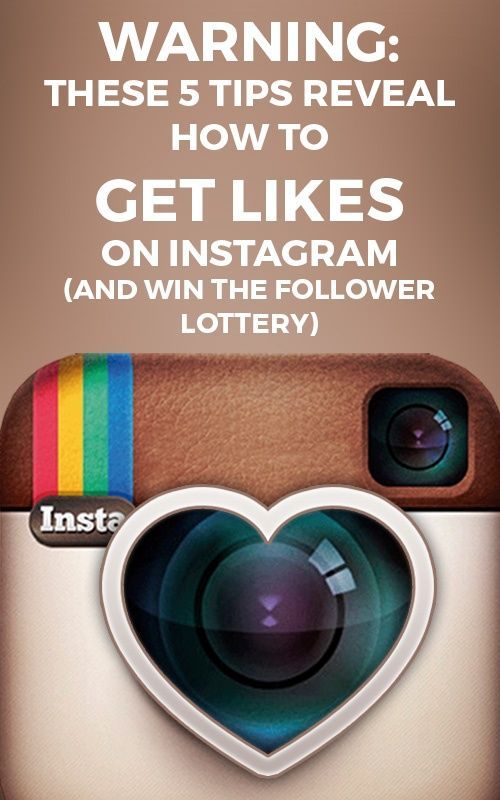
2 notes
·
View notes
Text
Snap Chat Addicts
We all in some way or form, have a friend that constantly snapchats. This person has to snap everything, how they wake up in the morning, what they eat, what they do on their free time and etc. Snapchat is considerably a new application today, in 2007, 10 years ago, snapchat wasn’t around and we have integrated snapchat into our culture tremendously. I have to admit sometimes I do snapchat a lot but it depends on the activity I’m doing and where I’m at. I spent the last Christmas break in Cancun and I had at least 4 snapchats a day. Reasonably that isn’t even a lot, some people have 20 snaps a day, and that is too high for my liking. I feel people who post 20 stories a day are annoying and eventually I stop looking at them and just skip by them. Alcohol can play a factor in over-snapping. I do admit, sometimes when I drink a little bit too much, I’ll post stories that if I were sober I wouldn’t, you wake up, take a look at your phone and see your story from the night before and immediately say things like “damn that’s embarrassing” “why would I post that” and delete all of them, we all have done it and if you haven’t then your awesome but me personally, I have. Snapchat has changed our society, with no question about that. But the question I want to ask you is, do you think snapchat has changed our society for the better or the worst?
https://www.nytimes.com/2016/11/30/technology/how-snapchat-works.html
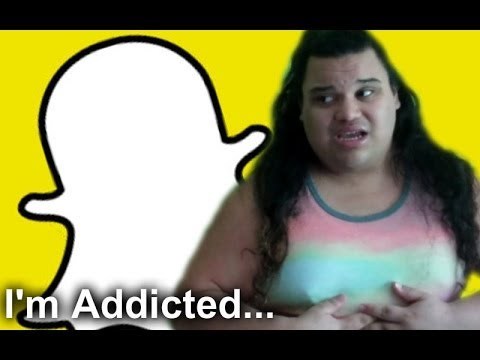
2 notes
·
View notes
Photo
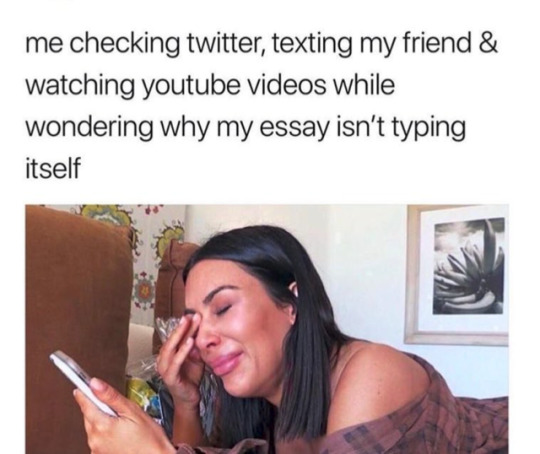
I thought this meme was a very funny meme to use in this weeks post because I can definitely relate to the technological distractions this meme is talking about. With my phone constantly on me, it’s hard not to get pulled into the online world. Even when I’m working on schoolwork, I’ll get a notification on my phone about Clash of Clans that will sometimes cause me to play the game, rather then do the homework I need to finish.
Instagram, Twitter, and Facebook are big distractions too. I’ll start to watch a video on Facebook or Instagram and before you know it, 20 minutes goes by and I still didn't finish the homework I could have had done. I also do homework in my room so another huge technological distraction for me is my Xbox. A lot of the time, I will have Netflix playing on my Xbox while I am doing homework and I’ll take twice as long to do the assignments because I wasn’t fully focused on them. Obviously the best thing to do is to just shut your phone and any other distractions off but that’s hard for some people to do.
3 notes
·
View notes
Text
Social Media Role In Social Movements
After discussing the whole idea of civic engagement through social media I really got thinking about how many social movements are drastically changed based of off social media. In today’s society, everything is on the internet. Our news and how we keep up with what is going on in the world. This includes keeping up with current events and movements. Personally, I think that so many social movements in the past few years have sparked into a wild fire due to social media presence. I feel as though social media allows people to be exposed to ideas, opinions, protests, and social changes that they may never would have seen without.
Lets discuss the black lives matter movement for instance. That is an easy one to discuss considering it was one of the largest movements in the past few years. Countless celebrities voiced their opinion on the matter, and an internet uproar was created, thus sparking real life protest even further. Social media played a monumental part in how big the movement was. It allowed stories to be told and seen by people that may have never saw them otherwise. This article explains the movement over time, and shows social medias role in its growth, How Black Lives Matter Uses Social Media Fight the Power. Another piece of social media platforms that allows movement ideas to reach even more people is celebrity involvement. Often times famous people will use their large following as a platform to express their opinions on political and social standpoints. This can create a huge difference in how big a movement can get. This is also present in the NFL kneeling for the national anthem protest. Huge celebrities with a massive following are using their fame as a platform to discuss something larger. I think a quick scroll through twitter and you could easily find your favorite celebrities opinions on most political matters. Sharing how you feel has just become part of being on the internet, and I think that this will continue to grow, and social media will continue to give voices to people and allow social change ideas to be reached by even more people.
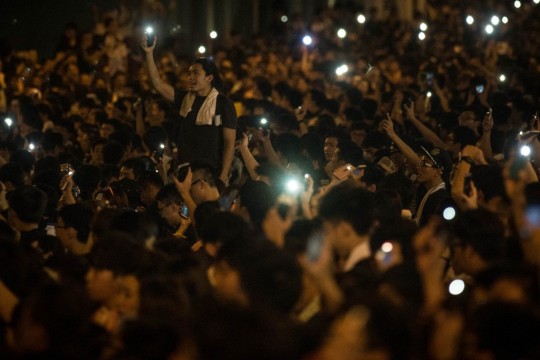
0 notes
Photo
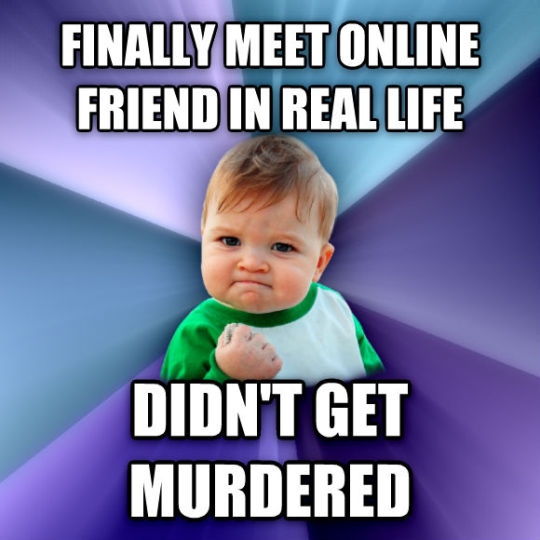
This post was inspired by an experience my roommate Molly had the other day.
So my roommate, Molly, was getting a coffee at Cafe Monte Alto (we call it Monte), and she noticed that she recognized the barista behind the counter. She couldn't tell where she knew this girl from, just that she had seen her at least a few times before. After placing her order, the girl behind the counter said to Molly, "and a name for order?" to which Molly responded with her name, and waited for her coffee. While waiting, she decided to check the popular social networking site, Instagram. Scrolling through her recent likes, she noticed a name that she didn't particularly recognize and she clicked it. It was then that she realized that the name belong to the barista who had just served her: She was instagram "friends" the the barista.
And so the plot thickens.
This brings me to my point (which took me a very long time to get to, I'm just now realizing). Molly and this girl (we could call her something barista-y though, like Maeve). So Molly and Maeve were, by media's definition, friends, and yet when Molly was standing at eye's height with Maeve and Maeve with Molly, they had no idea.
So what does it mean to be friends?
In an article published by the Huffington Post, journalist Mary McLaurien attempts to define just that. Definitely take a look for yourself (she's actually has some pretty compelling arguments), but to summarize, she basically argues that an online friendship isn't worse than an in person relationship. Infact, she argues that it is a much better environment for a friendship to blossom and to be maintained. She credits much of her success in writing, and in life, to the friendships she cultivated on the internet.
But as always, I'm more interested to hear what you think.
3 notes
·
View notes
Text
Trump and his Twitter
It is 2017, our president is Donald Trump, and he communicates with us through his Twitter account. It does sound a little unreal, but it is true. Although Obama also had a twitter, he did not use it as often as Trump does. Trump enjoys Twitter a lot. In fact, he said himself that he wouldn't have been able to win the election without his social media usage. The problem/controversy with Trump's twitter usage is that he often uses it to tweet about things other than politics. For example, a couple weeks ago he called Lavar Ball over Twitter, calling him disrespectful for not giving him thanks for helping his son get out of a Chinese jail and back into the United States. Another one of Trump's social media rants has been about the NFL recently. Throughout this season, Donald Trump has been criticizing the NFL & their players for kneeling during the national anthem. What Trump doesn't understand is that these players are protesting social injustice throughout our country.
http://www.independent.co.uk/news/world/americas/us-politics/donald-trump-tweets-twitter-social-media-facebook-instagram-fox-business-network-would-not-be-a8013491.html
While Trump was focusing on blasting the NFL, the whole island of Puerto Rico was still without power. Don't you think our president should be tweeting about other things at this time? Or maybe not tweeting at all? I have mixed feelings with the idea that our president should be active on social media. It does seem like a good way for him to connect with us, but is he doing it in the right way? What are your thoughts on our president's usage of Twitter? Do you think he should keep his personal thoughts to himself?
0 notes
Text
Big Smelly Satire
In class this week we discussed the news, the validity of news, and what constitutes news. In the midst of our discussion, the topic of satire came up, and how it can be confused with real news (if you are not familiar with satire, here is an example). The Oxford dictionary defines satire as "The use of humour, irony, exaggeration, or ridicule to expose and criticize people's stupidity or vices, particularly in the context of contemporary politics and other topical issues". You will see a lot of satire in political comics as well as on TV in shows like The Colbert Report (R.I.P.). In "A Point of View: What's the point of satire?", Will Self says that satire's purpose is to "comfort the afflicted and afflict the comfortable" (2015). At the end of his article, he discusses satires place in our current culture, and says "The problem for satire is thus that while we live in a globalized world so far as media is concerned, we don't when it comes to morality. Nor, I venture to suggest, will we ever"(2015).What he's saying is that if the world is not on the same page morally, satire does not work. There can't be confusion between who the comforted and the afflicted should be. Of course that is just one way to look at satire, but no matter how you define satire, it still makes an impact, and can often make people upset. In 2015, the French satirical news paper Charlie Hebdo was attacked by Al-Qaeda terrorists, killing 12 people. There have been many stories of different types of journalists who have been killed or captured because of the work that they do. So that raises a few questions. How would you define satire? Is satire really accomplishing anything? Who is it benefiting?
0 notes
Text
National Surveillance Agency?
Surveillance, Surveillance, Surveillance, a 21st century conundrum. How much of your private information would you give to the government in return for security? The digital age has opened doors that the NSA didn’t even know existed. As discussed in class, much of our personal lives are tracked, logged, and used against us without our consent. The work of Edward Snowden revealed secrets about the government that none of us saw coming. Thanks to his brave work and that of traditional journalism, the general public now knows just how much of their private lives are being violated. While many remain unbothered and use the ‘I have nothing to hide’ argument, consent was never given in the first place, or was it?
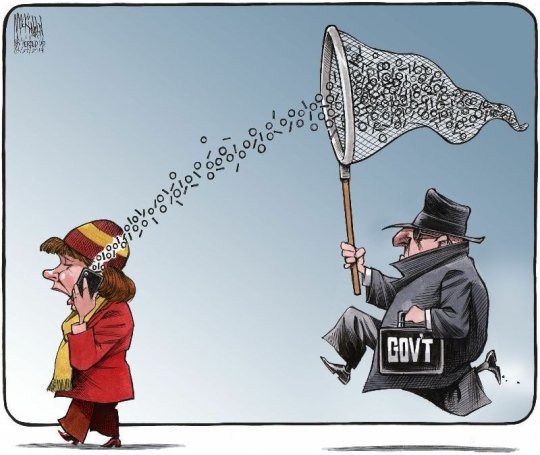
Honestly, how many of us can say we read terms and conditions section line for line? Most recently I saw a website that gave an option to skip them all together, no need to scan I guess. What difference does it make to us? According to a Global Research study, the NSA and Facebook are in cahoots! What you send, receive, like, are tagged in, etc., the government can access. Part of what Kurt Nimmo, was researching in this study found that Facebook, Apple, and Google tried to claim ignorance in the whole Snowden ordeal but NSA officials say they were in on the data heist. Mark Zuckerberg admitted in 2009 that Facebook is in essence a platform for harvesting data and conducting surveillance. Good luck out there guys, today’s transparency is tomorrows social control.
4 notes
·
View notes
Text
The Future of News and what it means to us.
After class today, I jumped right onto my computer to begin a post. The topic of discussion is the future of news. Everything today will either stay or slowly fade away like everything in life that happens. Print media was a popular medium for civilians to get updated on news and current events, that was in the early 1900s and then began to slowly fade away with the innovation of Radio and Television. Today in 2017 that change remains the same, with social media platforms taking control of news and current events. Becoming a competitor for News networks like Fox, CNN and other multiple news outlets. The question that arises today, is what medium do people use to stay updated with world news and current events? In an article, I found called The Future of news is humans talking to machines written by Trushar Barot
http://www.niemanlab.org/2017/09/the-future-of-news-is-humans-talking-to-machines/
talked a lot about human interactions with technology and how technology is communicating and interacting with humans is changing the way society works. It’s becoming clear that users are finding it useful to interact with devices through voice. Even that concept today is new, Amazons Alexa and Microsofts Cortona can be the next big threat to journalism. Saying "hey Alexa, what happened in the world today?" and that is how someone can get news, its fast and simple. Myself personally I want to get into the work of media studies and broadcast television. This makes me rethink that profession and be scared of what is going to be around when my kids are my age, how will kids get the news in 2050 or even the year 3000? Thoughts or comments?
9 notes
·
View notes
Text
Social Media and our addictions to it keep us from family time.
My family is one that is extremely close, and to that degree we are also very tradition oriented. I remember the good old days back when I was 10 years old and everyone had an Ipod classic or ipod nano, nowadays everyone is too distracted with what notification they just got on their iphone.
As we have been learning in class social media especially nowadays is very imbedded into our everyday lives, and reaching a higher point of social capital is something that everyone is striving for. While this is to be commended if one has gotten their exposure to the world of social media, it seems there is a disconnect that needs to happen at family gatherings like Thanksgiving and it just isn't happening.
My Great Grandmother is 97 years old this year, and she absolutely loves seeing the entire family together and enjoying each others company, and it makes her sad to see everyone on their phones and ignoring one another. This has become a problem over the years due to everyone becoming more invested in the social worlds we maintain online.
However this doesn't have to be the only case, social media is a medium that is designed to be shared and observed by other people and it can be a good connector piece to those that want to observe what kinds of things you partake in online, even in family gatherings.
I wanted to ask, what do you all think of social media and technology being present at family gatherings? Should there be a balance more of when technology should be used with everyone, or is social gatherings supposed to be social without social media?
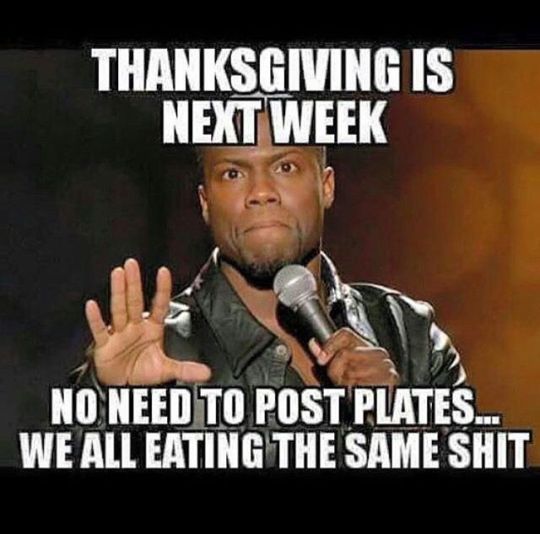
0 notes